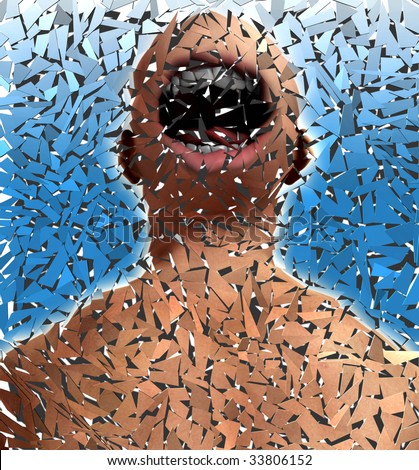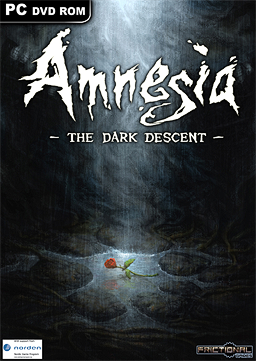Hello, hello!
A note before we get underway: I will be referring to and linking to descriptions of various disorders. If you identify with these symptoms and experiences, you may want to consult a specialist. I am not a diagnostician or psychiatrist, and you probably aren't either, so don't diagnose yourself based on a few links on the internet.
Okay, so, with that done--let's get back to the tea in China, as my mother says. As a reminder, the issue was this article. I agree, but not completely. Last week, we broke down what mental health issues mean, and this week, we'll talk about it in relation to gaming.
 |
Source. I know it's got a watermark. But a broken screaming mirror-head was too cool to resist. |
What does this have to do with gaming?
As mentioned, games love to use insanity as a device. Sometimes it's portrayed really badly and inaccurately--but sometimes, that's actually okay. Lovecraft's monsters have less to do with schizophrenia than they do with tapping into the psychedelic experiences caused by substance use (a theme in a few of the stories, actually) and tapping into the fundamental fears of childhood. Anyone who's cuddled up under the covers, clutching a pillow or toy frantically, trying to avoid breathing or moving--paralysed by fear of imaginary beasts under the bed, in the hall, or in the closet, can understand where Lovecraft is coming from. Then, too, the insane and unworldly logic of dreams and the bizarre things our minds combine influence a lot of games. The stuff my own brain has come up with as a result of the unusual serotonin and dopamine levels experienced during REM ended up inspiring a series and a whole bunch of short stories. In a way, video games are not playing on real mental health disorders, but on the vagaries of healthy minds when they stray in dark directions.
The issue is that people might be getting the wrong idea about how mental health works from these games. Obviously, there's also the problematic (push the buzzer because I said the 'p' word, do it, I dare you) treatment of mental health issues everywhere else in the media, too. People are gradually becoming more aware of it, especially with all the shootings in the States lately, but the problem is what you might call a "piling on" effect. Sure, books often have better depictions, but not everyone reads a lot, and not all books are accurate about the matter, either. And just because everything else is crappy, doesn't mean games should aim for the lowest common denominator in quality.
Mental health issues do not make someone violent just because they exist, for the most part. But gaming is just beginning to figure that out. I don't think we need to keep heroes homebound for weeks--though montages would handle the problems with that nicely--but it should be an option, shouldn't it? It's a challenge for writers, but challenges in writing keep one sharp and improve storytelling abilities.
Another consideration is representation, which has a very positive effect on self-perception and long-term success. People mock Tumblrites for self-diagnosis, but anxiety and other disorders actually appear to be more prevalent than we expected anyway. So while the internet might not be the best way to figure out if something is wrong with you, sometimes it's a good place to find help. Sometimes. And by offering better depictions in games, there is a chance that gamers will find ways to deal with their own demons.
Well, actually, yes. There needs to be more of a crowbar between the fictionalized depictions of insanity, which are artistic, and the portrayals of real disorders. It would be nice if more writers and artists actually spoke to people with mental health issues and flipped through the DSM list to get a better idea of what they're trying to depict. One game that actually humanized people with mental health issues pretty well and dealt with therapy (in a very metaphorical way) was Psychonauts, mentioned above. Dead Space and Mass Effect 3 actually touch on PTSD, but don't really resolve it. Also, mental health issues tend to magically dissolve until they're needed for plot reasons, and they really don't work like that in real life.
Things are changing, however; just the fact that Depression Quest exists is a massive step forward. This, this, this, and this may be relevant to your interests if you're looking for realistic games. I will warn you that the last one is so creepy, I noped out part of the way through.
So, on that perky note, I can only say--sweet dreams, readers. Remember--real life is even more terrifying than anything that could possibly happen in a game.
*Edit*--a wonderful and very articulate article about video games and the potential they have to teach people compassion appears here.
But...but...what's wrong with that?
The issue is that people might be getting the wrong idea about how mental health works from these games. Obviously, there's also the problematic (push the buzzer because I said the 'p' word, do it, I dare you) treatment of mental health issues everywhere else in the media, too. People are gradually becoming more aware of it, especially with all the shootings in the States lately, but the problem is what you might call a "piling on" effect. Sure, books often have better depictions, but not everyone reads a lot, and not all books are accurate about the matter, either. And just because everything else is crappy, doesn't mean games should aim for the lowest common denominator in quality.
Mental health issues do not make someone violent just because they exist, for the most part. But gaming is just beginning to figure that out. I don't think we need to keep heroes homebound for weeks--though montages would handle the problems with that nicely--but it should be an option, shouldn't it? It's a challenge for writers, but challenges in writing keep one sharp and improve storytelling abilities.
Another consideration is representation, which has a very positive effect on self-perception and long-term success. People mock Tumblrites for self-diagnosis, but anxiety and other disorders actually appear to be more prevalent than we expected anyway. So while the internet might not be the best way to figure out if something is wrong with you, sometimes it's a good place to find help. Sometimes. And by offering better depictions in games, there is a chance that gamers will find ways to deal with their own demons.
Do we need to fix it?
Things are changing, however; just the fact that Depression Quest exists is a massive step forward. This, this, this, and this may be relevant to your interests if you're looking for realistic games. I will warn you that the last one is so creepy, I noped out part of the way through.
So, on that perky note, I can only say--sweet dreams, readers. Remember--real life is even more terrifying than anything that could possibly happen in a game.
*Edit*--a wonderful and very articulate article about video games and the potential they have to teach people compassion appears here.
*****

